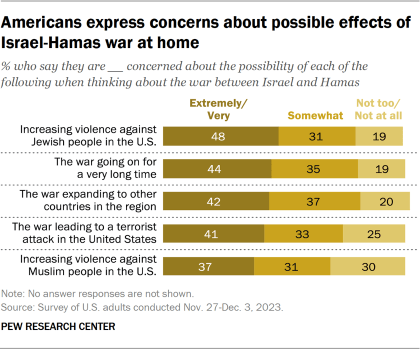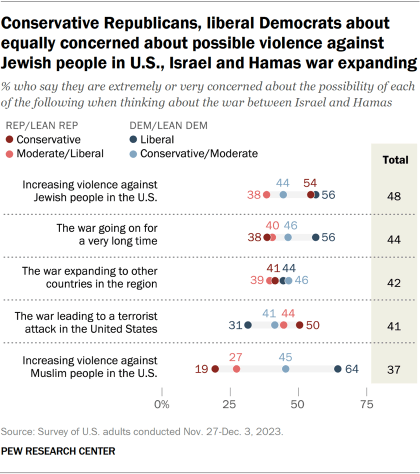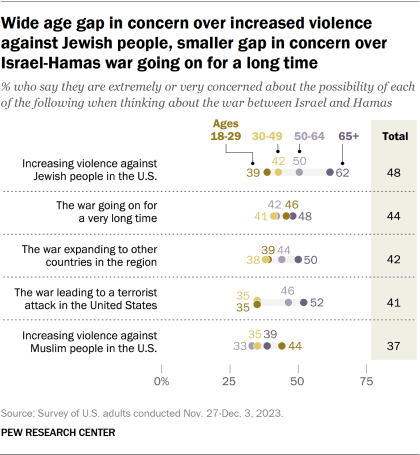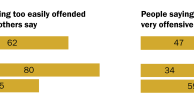As the war between Israel and Hamas enters its third month, many Americans are at least somewhat concerned about several aspects of the war – including the possibility of increased violence against Jewish people in the United States or the war going on for a very long time.

About half of Americans (48%) are extremely or very concerned about the possibility of increasing violence against Jewish people in the U.S., while a smaller share (37%) say this about the possibility of violence against Muslims in the U.S. About three-in-ten (31% each) say they are somewhat concerned about the possibility of violence against each of these groups.
And four-in-ten or more are extremely or very concerned that the war may go on for a very long time (44%), expand to other countries in the Middle East (42%) or lead to a terrorist attack in the U.S. (41%).
Concerns by party and ideology
Several of these concerns cut across the ideological spectrum, while there are wider ideological divides for others.
Concerns about increasing violence against Jewish people in the U.S.

For instance, 54% of conservative Republicans and a similar share of liberal Democrats (56%) say they are extremely or very concerned about the possibility of increased violence against Jewish people in the U.S. Smaller shares of moderate and conservative Democrats (44%) and of moderate and liberal Republicans (38%) express this concern. (These groups include independents and others who lean to each party.)
Concerns about increasing violence against Muslim people in the U.S.
A 64% majority of liberal Democrats express a high level of concern about increasing violence against Muslims in the U.S., a view shared by 46% of conservative and moderate Democrats. Republicans are substantially less likely to hold this concern: 19% of conservative Republicans and 27% of moderate Republicans say they are at least very concerned about this possibility.
Concerns about the potential for terrorism in the U.S.
Conversely, Republicans are more concerned than Democrats that the Israel-Hamas war may lead to terrorism in the U.S. Half of conservative Republicans and 44% of moderate and liberal Republicans are extremely or very concerned that the war may lead to a terrorist attack in the U.S. By comparison, 41% of conservative and moderate Democrats and 31% of liberal Democrats say this.
Concerns about the duration of the war and the conflict expanding in the region
There are only modest ideological differences in concerns about the possibility that the war between Israel and Hamas will expand to other countries in the region, with roughly four-in-ten in all groups saying they are extremely or very concerned about this.
Democrats – especially liberal Democrats – are more likely than Republicans to say they are at least very concerned that the war could continue on for a long time. A 56% majority of liberal Democrats, along with 46% of conservative and moderate Democrats, say this. About four-in-ten Republicans (41% of conservative Republicans, 38% of moderate and liberal Republicans) express the same level of concern about this.
Concerns by age

There are relatively modest age differences in concerns about how prolonged the war will be, while older Americans are more likely than younger Americans to express concern about the war expanding into a regional conflict or leading to a terrorist attack in the U.S.
The age gap is particularly wide over concern about the possibility of increasing violence against Jewish Americans: 62% of those 65 and older and 50% of those 50 to 64 say they are extremely or very concerned about this, while 39% of adults under 30 (and a similar share – 42% – of those 30 to 49) say this.
About four-in-ten (39%) of those 65 and older say they are extremely or very concerned about the possibility of violence against Muslim people in the U.S., with 44% of those under 30 saying this. Both younger and older adults are modestly more likely to hold this concern than those ages 30 to 64.




